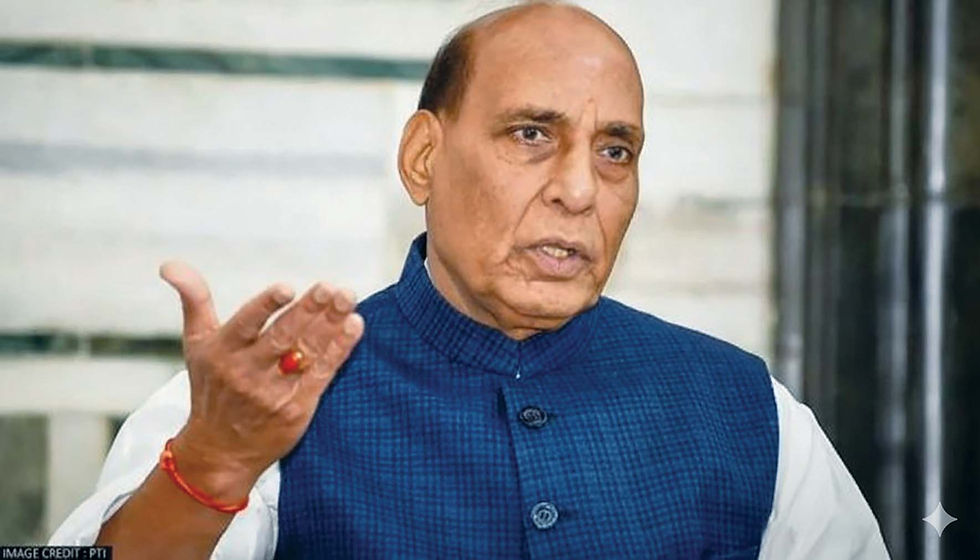Unholy Alliances: How Pakistan’s Friends Undermine India’s Security
- Kiran D. Tare

- May 14
- 4 min read
As Turkey arms Pakistan, China shields it and Azerbaijan cheers, India must chart its own course to counter this new crescent of hostility.

Throughout Operation Sindoor, which India launched as retaliation against Pakistan for the April 22 massacre of tourists at Pahalgam, there loomed the shadow of an unsettling axis: Turkey, Azerbaijan and China.
These three allies of Pakistan, though disparate in geography and ideology, are united by a shared hostility towards India cloaked in the garb of strategic cooperation.
Despite the fact that India continues to pour billions of rupees into their economies via tourism and trade, Turkey and Azerbaijan especially continue to underwrite Pakistan.
In the last fiscal year, Indian tourists spent more than Rs.4,000 crore in Turkey and Azerbaijan combined, enriching their airlines, hotels and wedding planners. In return, Ankara has loudly announced its support for Pakistan after Operation Sindoor.
Preliminary forensics suggest the drones that breached Indian airspace were Turkish-made AsisguardSongar models (over 300 Pakistani drones had targeted India’s military and civilian infrastructure at 36 locations). A Turkish anti-submarine corvette had even docked at Karachi earlier this month, days after a Turkish military aircraft landed at the same port city. Turkey claims these were routine stops.
But nothing about Turkey’s relationship with Pakistan is ‘routine.’ Turkey is not merely a rhetorical cheerleader for Pakistan on Kashmir but its enabler. Turkish President Recep Tayyip Erdogan has repeatedly voiced support for Islamabad’s claim on Kashmir in flagrant disregard of Indian sovereignty. His ties to Pakistan run deep, cemented by political Islamism and Cold War nostalgia. Since 2003, Erdogan has visited Pakistan at least ten times. A robust defence relationship has emerged, with Turkey becoming Pakistan’s second-largest arms supplier after China. The Ankara-Islamabad military nexus spans everything from Bayraktar drones to submarine upgrades.
But Erdogan’s ambitions do not end in South Asia. Turkey seeks influence in the Indian Ocean Region, competing with the Gulf monarchies. Its naval posturing, its base in Somalia and its drone deals with Maldives are part of a wider design.
If Turkey plays the ideological partner, Azerbaijan plays the opportunistic junior. A Turkic sibling and a staunch Pakistani ally, Baku has aligned itself closely with Ankara and Islamabad. Pakistan does not even recognise Armenia as a state, and in return, Azerbaijan openly supports Islamabad on Kashmir. This year, Pakistan agreed to sell Azerbaijan advanced JF-17 Thunder jets in a deal worth $1.6 billion. The three nations held their first trilateral summit in July 2024.
If Turkey is Pakistan’s ideological partner, China is its indispensable strategic benefactor. The roots of Sino-Pakistani cooperation stretch back to the early Cold War years. Their bond blossomed after Pakistan’s support to China during its 1962 war. As India leaned toward the Soviet Union, China, like the United States, found in Pakistan a useful counterweight and an intermediary to the West. It was Islamabad that facilitated the 1971 secret visit of U.S. Secretary of State Henry Kissinger to Beijing, laying the groundwork for U.S.-China rapprochement and the historic meeting between Richard Nixon and Mao Tse Tung.
This strategic alignment grew deeper in the 1980s and 1990s, as China helped Pakistan build its nuclear and missile capabilities. The Kahuta Research Laboratories, the cornerstone of Pakistan’s uranium enrichment program, received critical Chinese assistance. In return, Pakistan became loyal diplomatically to China by supporting Beijing’s stance on Taiwan, Tibet, Xinjiang and the South China Sea.
In 2015, China launched the $62 billion China-Pakistan Economic Corridor (CPEC), its flagship Belt and Road Initiative project, linking Xinjiang to the Arabian Sea. For Pakistan, it offers economic revival; for China, strategic access to the Indian Ocean. Despite frequent attacks on Chinese assets by Baloch and Islamist militants, the partnership remains strong, marked by joint military drills, arms deals, and regular diplomatic engagement.
At the UN, China has repeatedly shielded Pakistan-based terrorists from being designated under sanctions regimes most notably, blocking the listing of Jaish-e-Mohammed chief Masood Azhar as a global terrorist for years until it could no longer withstand international pressure in 2019.
During Pakistan’s escalations with India, like the Balakot airstrike in 2019 or the scrapping of Article 370 in Kashmir, China has amplified Pakistan’s line on Kashmir at international forums. For decades, Beijing has propped up Pakistan’s military machine, from nuclear assistance to advanced drone technologies.
To counter them, India’s foreign policy will have to be built on hard-nosed realism. The United States, for all its rhetoric of strategic convergence, is an unreliable partner. It coddled Pakistan for decades, armed it with F-16s and turned a blind eye to its nuclear adventurism.
The same applies to the Gulf. While Saudi Arabia and the UAE have recently shown more sensitivity to India’s position, their loyalties remain elastic. Their neutrality today is tactical, not principled.
India, therefore, must rely on no one but itself. To counter the threat of Pakistan and its allies, India must do three things. First, continually bolster its domestic defence manufacturing ecosystem. The pace and success of the Atmanirbhar Bharat initiative, especially in drone warfare, electronic intelligence and space-based surveillance must not be allowed to flag.
Second, it must tighten economic levers. Turkey and Azerbaijan do not deserve Indian tourism revenue or infrastructure contracts while they actively undermine Indian interests. A soft boycott must be imposed - not as a jingoistic gesture, but as a strategic signal.
Third, India must foster internal unity. A nation under attack cannot afford the luxury of domestic discord or imported delusions. While hostile drones breached Indian skies, some sections of the Indian media echoed Pakistan’s line, proof that not all threats wear a uniform.
Remember, unity, not ideology, must be India’s first line of defence.





Comments